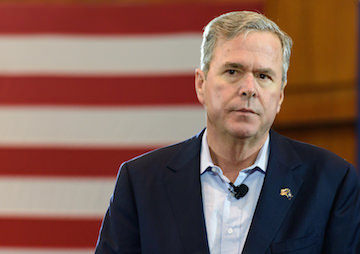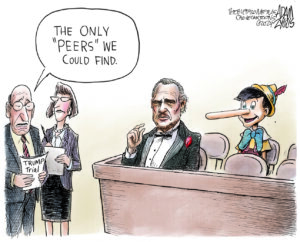Jeb Bush Is Out of the Running — Discuss
He came, he became bewildered, he didn't conquer. This is the face of someone reading the writing on the wall: then-GOP presidential candidate Jeb Bush during a town hall meeting last week at the Columbia Metropolitan Convention Center in South Carolina. (Crush Rush / Shutterstock)
This is the face of someone reading the writing on the wall: then-GOP presidential candidate Jeb Bush during a town hall meeting last week at the Columbia Metropolitan Convention Center in South Carolina. (Crush Rush / Shutterstock)
He came, he became bewildered, he didn’t conquer: Although Jeb Bush was initially on track to have his coronation, thereby joining his father and brother as their party’s pick for president, that GOP regime came to an abrupt end Saturday in South Carolina.
So, what happened? The answer may seem obvious and expressible in a mere two words — those would be Donald Trump — but there’s more to the story than a certain tangerine-hued bruiser crashing in and eating Jeb’s lunch in front of him, repeatedly, for months on end.
Throw in a dash of dynasty fatigue on the part of American voters (at least on the right), a few delayed reactions and strategic snafus on Bush’s part, legacy issues from his brother’s White House tenure, a couple of sharp-elbowed younger whippersnappers from within and without the establishment, and a Republican identity crisis, and the arc of Bush’s plunge looks more complete.
The Washington Post’s Chris Cillizza professed his clairvoyance Sunday in a primary postmortem bluntly titled “Jeb Bush never really had a chance in the 2016 presidential race.” Here’s a closer look at Cillizza’s contentions:
The reasons are many and complex, but, at root, they all come back to this basic fact: Jeb Bush is a fundamentally decent man who was badly miscast in the 2016 presidential race.
Bush was, and is, a soft-spoken policy wonk raised in a family that produced not one but two presidents. He is polite. You might even describe him as genteel. He is a rule-follower. And he is simply not all that into the campaigning end of politics.
Bush’s long-held and well-known disdain for the nitty-gritty of modern campaigns was why I was stunned when it became clear in early 2015 that he was going to run for the Republican nomination. But even then, there were signs that Bush might not fully grasp the realities of the process.
These revealing indicators included Bush’s interest in running a “positive” and “uplifting” campaign — which, given how the 2016 GOP contest has actually gone, sounds goofily quaint in retrospect — along with a certain awkwardness and apparent inability to process the reality of a campaign swiftly gone vicious, and a fatal lack of awareness about how his party had evolved since the last Bushozoic era.
A large part of that last point, of course, has to do with a bipartisan phenomenon this writer has previously referred to as realitics. To wit, here’s The Guardian’s Jeb Lund with his analysis, featuring a telling quotation from Jeb himself:
In announcing the suspension of his campaign, Jeb Bush couldn’t have found a more apt expression for his departure from a contest that was beyond his ken than “I congratulate my competitors who are remaining on the island”. The 2016 Republican presidential primary is a thing forged in madness; as befitting the functional illogic of a reality TV show, it doesn’t make a lick of damn sense beyond itself, but the results cannot be appealed. Jeb has been voted off the island; he is the weakest link; goodbye.
MSNBC’s Steve Benen got into the nuts and bolts of Jeb’s campaign strategy and where things went south even before South Carolina:
There wasn’t a single moment that doomed Jeb’s candidacy, though his week-long struggle with a question about whether the war in Iraq was a good idea still stands out as a turning point in the race. What’s more, he didn’t falter as a result of a scandal or humiliating gaffe.
Bush’s problem was more fundamental. He was the wrong candidate with the wrong message at the wrong time. He had strengths – a conservative record, a family pedigree, a willingness to talk about public policy in a half-way serious way – which just happened to be the exact opposite of what Republican primary voters were looking for in 2016. Bush, who hasn’t run a successful campaign since 2002, at times seemed surprised to discover a GOP electorate he hardly recognized.
Back in early December 2014, Bush made a striking observation: he conceded that his party’s presidential nominee would have to be willing to “lose the primary to win the general.” He added at the time, “It’s not an easy task, to be honest with you.”
Nearly 15 months later, we know – and now he knows – just how difficult that task can be. Bush generally stuck to the belief he articulated at the time, and it cost him dearly.
Benen also pointed out a handy bit of trivia about which Jeb Bush is no doubt keenly aware: The last time the GOP prevailed in a presidential election without someone named Bush or Nixon on the ballot was in 1928. But as this third member of the Bush clan knows all too well, gambling on old patterns holding their shape doesn’t always pay.
Finally, Slate’s Josh Voorhees offered his take on how other candidates besides Trump in the crowded GOP phalanx helped sink Bush’s battleship — and what his exit means for the remaining rivals:
Trump wasn’t the only one who had a hand in Jeb’s defeat. Rubio, Bush’s former protégé, decimated him on the debate stage this past fall, creating the “Jeb is doomed” narrative that eventually became a reality. Bush was forced to compete in a crowded “establishment lane” with Rubio, Kasich, and (until recently) Chris Christie, the latter two of whom also touted their gubernatorial experience on the stump. And Jeb himself never quite decided whether to run towards or away from his brother’s record until it was too late.
The big question now is whether Bush’s supporters—and donors—get behind Rubio en masse, or if some significant number go to Kasich, still coasting off his second-place finish in New Hampshire. Jeb could boost either candidate with an endorsement—though backing Rubio would be awkward given how often the two clashed on the stump, and boosting Kasich would cause an even bigger headache for the Republican Party. Regardless, Jeb’s exit gives his former rivals some much-needed space in the establishment lane. If Rubio can consolidate the support he needs to mount a serious challenge to Trump, the Donald might be left wishing Bush were still around.
All this remains to be seen; that it’s game over for Bush is the only certainty in play in this topsy-turvy campaign season. And whatever Trump may wish going forward, he evidently wished on Sunday to dispel a satirical statement that MSNBC host Lawrence O’Donnell treated as hard news on the air the night before:
A quote was read from a parody account last night on MSNBC re: Jeb. https://t.co/4twxJ4blje
— Donald J. Trump (@realDonaldTrump) February 21, 2016
–Posted by Kasia Anderson
Your support matters…Independent journalism is under threat and overshadowed by heavily funded mainstream media.
You can help level the playing field. Become a member.
Your tax-deductible contribution keeps us digging beneath the headlines to give you thought-provoking, investigative reporting and analysis that unearths what's really happening- without compromise.
Give today to support our courageous, independent journalists.






You need to be a supporter to comment.
There are currently no responses to this article.
Be the first to respond.